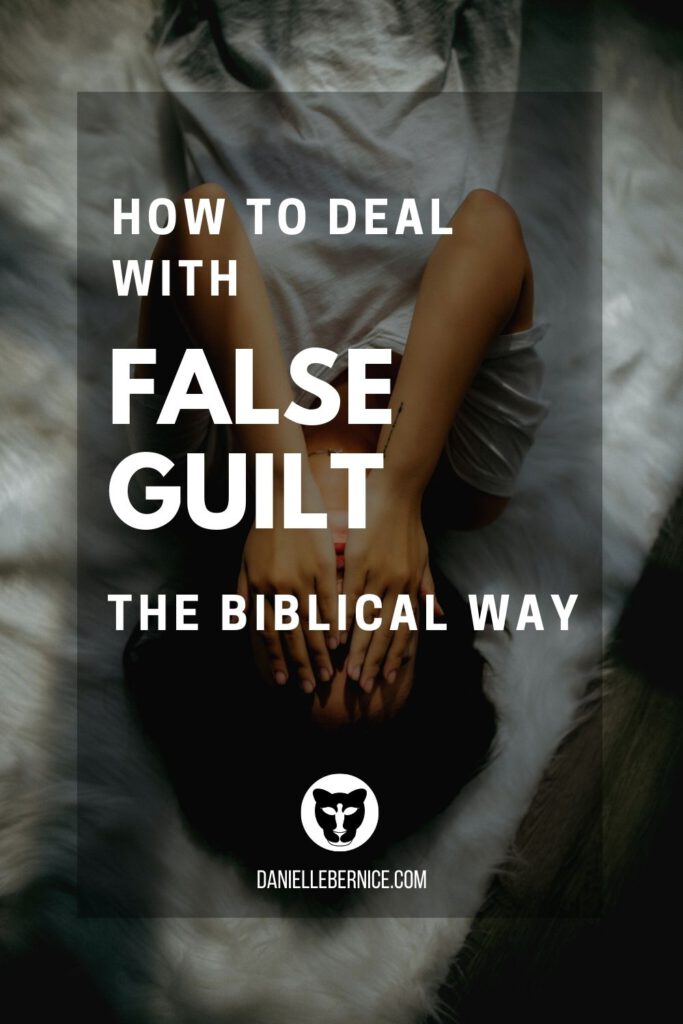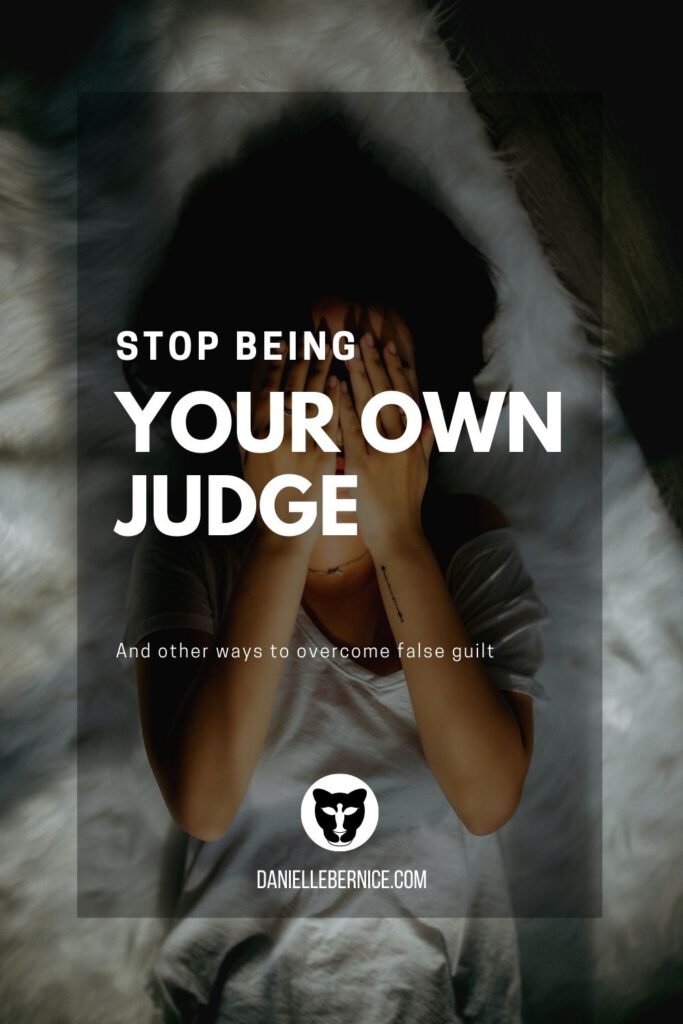Where does false guilt come from? What is the difference between true and false guilt? And most importantly: how do you overcome false guilt?
We all know the gnawing feeling of guilt. And the condemning, accusing voice that confronts you with mistakes you made in the past. Although most people know these feelings, some are attacked by false guilt more often than others. I used to struggle with it multiple times a day myself. And so I know how false guilt can steal your joy if you allow it to.
So how do we get rid of false guilt, the Biblical way?

The difference between true guilt and false guilt
Let’s start with the fact that there is nothing wrong with feeling guilty after making a mistake. Your conscience telling you that you did something wrong is part of every healthy person’s life, whether you are a Christian or not. That is the way we realize we need to set something straight.
The feeling is supposed to be uncomfortable, that way it spurs us into action. Namely the action of repenting and so seeking forgiveness.
The very fact that you recognize your guilt is a good sign, because who would repent and ask for forgiveness if they don’t feel sorry, or worse: if the sin feels good?
None of us are immune to feeling guilty because we all sin and we all make mistakes, for we all fall short of the glory of God (Romans 3:23, 1 John 1:8-10).
Things get problematic when we can’t distinguish between false guilt and true guilt anymore.
So, what is the difference?
True guilt
My perception, based on what is written in the Bible, is that one is truly guilty when he or she does something that goes against the will of God (Leviticus 4, Jeremiah 3:13, Hosea 5:15, 1 Corinthians 5:11, James 4:8-10). This includes sinning against another person, yourself, or God.
Only God decides whether or not something is classified as sin, and so whether or not you are truly guilty. His Spirit is the Spirit of Truth, and since the Holy Spirit is our Advocate, He knows whether or not we are guilty, and will set us free from that guilt when we repent (John 15:26, 1 John 2:1). And of course, He knows His Own will like no other.
1 Sinning against God
Everybody in this world, however “good” a person seems to be, is guilty of sinning against God until he or she turns to Jesus in repentance. Because Jesus said that the greatest commandment is to love God with all your heart and with all your soul and with all your mind (Matthew 22:37-38). Nobody can truly do that without coming to Christ.
The moment we make Jesus our Lord and Savior and accept His sacrifice on the cross to take away our sins once and for all, we are pardoned and set free from sin (Romans 6, Ephesians 1:7). At that moment we are justified, and receive the Holy Spirit, Who sanctifies us and guides us into seeing and savoring God for Who He is.
From that point on, the moment we do sin against God in some way, we will realize this, and repent more deeply. By doing so, we will be transformed and grow even closer to God.
All sin is eventually against God. He sets the standard: Be like Him – perfect in every way (Matthew 5:48, Deuteronomy 32:4, 2 Samuel 22:31). Of course, we all fail to be perfectly like Him, but the Holy Spirit helps us to grow in following His ways. And if we follow His ways, we are not sinning. Better yet: we will do good and loving things that lead to His glory and our virtue.
2 Sinning against another person
The second greatest commandment is “Love your neighbor as yourself” (Matthew 22:39). So every time that somebody treats another person with less loving mercy or forgiveness than they themselves want to receive, they are sinning against that person. And even worse, implicitly they are sinning against God since they are not obeying His commandments.
3 Sinning against yourself
Sinning against yourself is a real thing. Paul says that by sexual immorality you sin against your own body (1 Corinthians 6:18). So, sexual immorality is a sin against yourself, against the body God gave you. And of course, in doing so, we sin against God too.
But there are also indirect ways in which people harm themselves:
- Each time that you willingly go against God’s will, you are hardening your heart and distancing yourself from God and so from the One Who blesses you and protects you.
- And if we continue believing that our salvation comes from works or by following the letter of the Law, we condemn ourselves (Titus 3:11).
Practicing any of these three categories of sin should make us feel bad so that we turn to God in repentance. And in doing so, we turn away from sin, which leads to righteousness and freedom in Christ.
False guilt
So, when is it false guilt?
As we’ve seen, true guilt always puts God first. It is Jesus-centered. It is when we realize we have sinned against Him. False guilt takes God out of the equation or lets other people dictate the standards we should fulfill. It happens when we shift the focus from Jesus to something else.
1 When you focus on other people’s opinions
For example, you might feel guilty when someone tells you that you have hurt them tremendously by something you said. The feeling likely stems from true guilt if you verbally abused them and did not communicate as Jesus would.
But if you lovingly gave them a message that Jesus put on your heart, in a gentle way, you should not feel guilty. Because the Word of God is sharper than a double-edged sword, so yes, people often do feel offended by hearing the Truth (Matthew 15:12, Hebrews 4:12). Also, whatever we do should be done for God’s glory (1 Corinthians 10:31). Not your glory, or theirs, but God’s.
So, when you are following God’s will and still feel guilty, it could very well be that you focus more on your feelings and the response of other people than on God. In that case, you make yourself and other people the judge of your actions, instead of God.
2 When you focus on works
Another example: sometimes people feel guilty that they did not do something a certain way. This can be triggered by having perfectionistic, unrealistic ideas of what they should achieve. They set the bar for themselves, and set it too high.
False guilt can also be triggered by thinking that you have to do something for someone to be appreciated. Whether that is taking the blame for someone’s actions when you did nothing wrong, or working harder so that you can be viewed as worthy. What happens, is that we focus on another person and make them the judge of our actions.
Note that this is similar to trying to achieve worthiness in God’s eyes by working harder instead of loving deeper.
3 When you focus on yourself
A final example is when people continue to feel guilty after having asked God for forgiveness because they think they are irredeemable. They then put themselves at the center instead of Jesus, and make themselves the judge instead of God.
When we don’t believe that He really forgave us for our sins by dying on the cross, it is because we rather believe ourselves (or another person speaking negatively into our lives). Don’t offend God by saying that the death of His Son wasn’t enough for you.
The fact that He allowed Jesus to die for you, demonstrates how much He loves you. That is how much He would like you to run to Him. He stands there with open arms waiting for you. Let Him lead the way and take that heavy yoke of guilt away from you.
From my experience and from what I was taught by professionals in psychiatry and psychology, people who have suffered abuse, feel false guilt way more often than people who didn’t suffer abuse. Even long after the abuse has stopped, it can still weigh you down, debilitate you, and imprison you. And that is precisely where the enemy wants you to be.
Don’t let him win! You are God’s and God’s alone!
How to deal with false guilt
These three actions have helped me tremendously in my fight with false guilt:
1 Put Jesus at the center of your life
Like we’ve seen: false guilt arises when you don’t put Jesus at the center of your actions, but shift your focus to someone else. So make sure that only God is the final Judge in your life. And He won’t condemn you if are in Christ Jesus (Romans 8:1) so don’t be harder on yourself than He is.
Sin doesn’t go away by beating yourself up over what you did. Beating yourself up just makes you feel hurt, tired, and weak, and therefore unproductive.
The way we fight sin is not with the weapons of this world, but with the sword of the Spirit, which is the Word of God. The truth of the Word of God working in our hearts, sanctifying us, is what prevents us from sinning the next time. Therefore, try focusing on a deeper understanding and incorporation of the Truth.
Also, consider the possibility that there could be underlying pride holding you back:
- What makes you so special that He would forgive anybody who asks, except you?
- And what makes you think you know better than the Word of God?
- Or why is Jesus’ death on the cross insufficient for you?
So, instead of trying to fix things by going over your mistakes over and over again, or by hurting yourself mentally or physically, humbly ask God to cleanse you and trust that He is faithful and just to do so.

2 Stop going back to the past
Sometimes, like a broken record, we can play a mistake we made over and over again in our heads. I used to struggle with this a lot.
In my case, after speaking in public, for instance, I often kept going over all of my mistakes. All of a sudden, some tiny misspeaking seemed to be a huge problem and hindered me from joyfully preparing for my next task.
This is unwise behavior for several reasons. Here are a few of those reasons:
- It makes me lose my focus on Jesus. If Jesus is Who I want to follow, if He is where my finish line is, then I should look to Him. Which marathon runner walks to the finish line while looking behind her? Whether or not she is looking at what she has already achieved or where she went wrong, if she doesn’t look where she is going, that would either trip her up or she will walk in the wrong direction altogether!
- God called me not because I earned His respect in some way or because I am so good at what I do. No, through my weaknesses it can be shown how merciful, patient, loving, wise, and strong God is. My weaknesses and disabilities glorify Him all the more because I can only do what I do, through Him.
- Going over my mistakes over and over again doesn’t make them go away; that is like trying to achieve righteousness in my own strength. What does make them go away is asking for forgiveness and for help with doing better next time, and if necessary – for help with fixing the problem I created.
3 Work on your faith
Instead of pondering on what you did wrong for longer than necessary, you should have faith that:
- God Almighty can use our mistakes for His glory. Don’t make your mistake bigger than God.
- He knew you would make this mistake before you were even born, and He still chose you.
- He will be faithful to forgive that sin, if you confess it to Him.
Wear your shield of faith against the poisonous arrows of the enemy. Don’t let the enemy cripple you in fear of making mistakes. Instead, rebuke the enemy when you feel that negative thoughts are eating away at your joy in the Lord.
And if your shield is weak because you lack faith, start with praying that God will sustain you, and listen to the Word of God to build up your faith (Romans 10:17).
You might also like: Renewal comes after repentance

